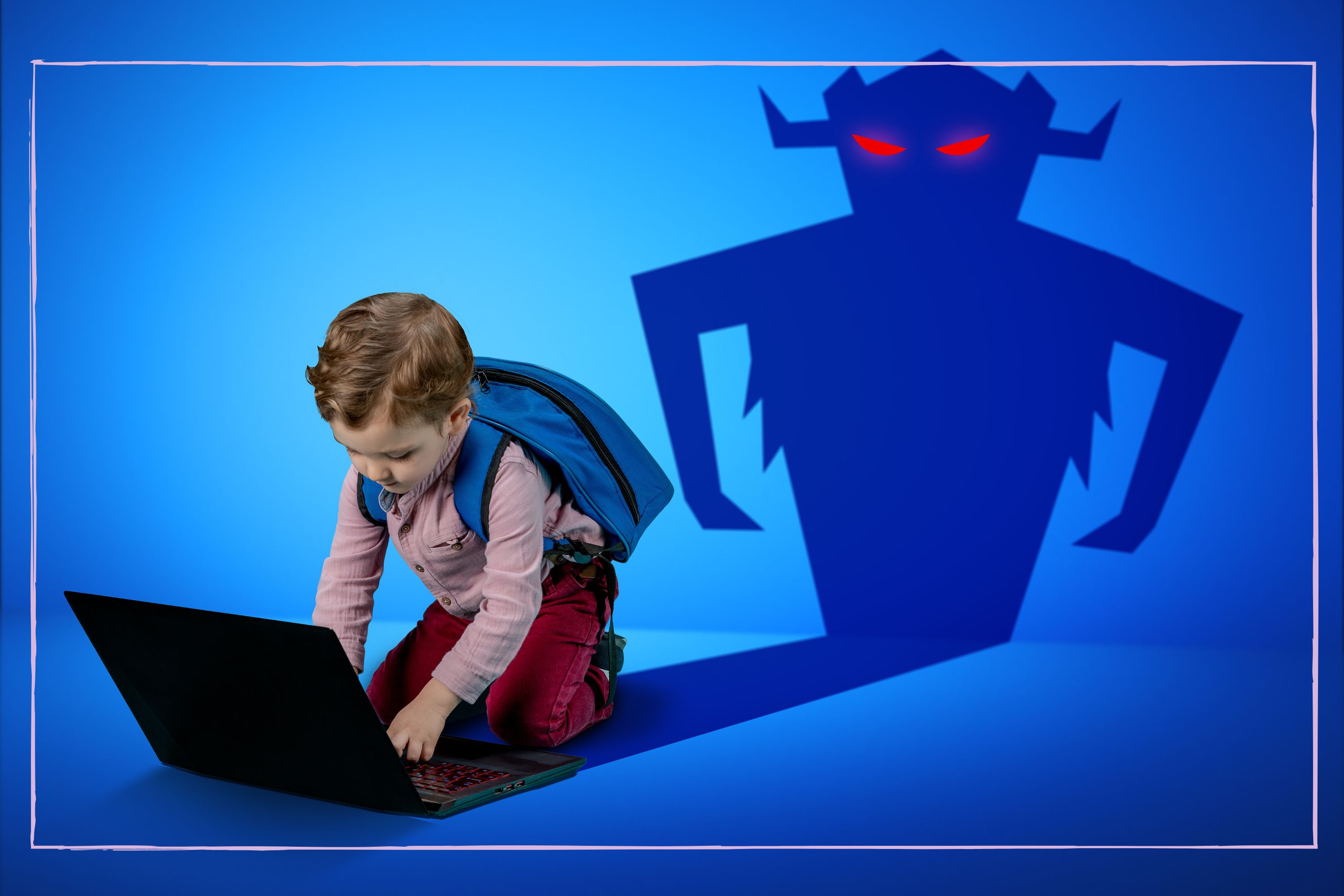This is how long it takes for children to come across ‘unsafe, age-restricted and illegal content’, according to a new study (and it’s quicker than you'd expect)
Whether your kids are supervised online or not, you'll be surprised how quickly they can access unsafe content


Almost one in 10 children are exposed to age-restricted content including pornography within 10 minutes of going online, distressing findings show.
While many parents are concerned with how to keep child safe online and how too much screen time can affects a child's development, many might be surprised to learn how quickly a child who is surfing the internet can come across harmful material...
Internet safety company VerifyMy conducted a study of 2,000 young people aged 16-19 from the UK and US who disclosed the risks they face online and almost one in 10 young people have come across Child Sexual Abuse Material (CSAM), with children as young as eight years old coming into contact with age-restricted (18+) content, including pornography.
But what's equally as shocking is the time it takes for a child to surface this harmful content - with young people admitting that they have encountered content that they consider unsafe, age-restricted or illegal within 10 minutes of going online.
And that's not all, almost a third (29 per cent) reported seeing content related to self-harm, while a quarter (25 per cent) have witnessed extreme violence, and over one in ten (12 per cent) have been exposed to extreme pornography.
Meanwhile, just 11 per cent of young people inform their parents or caregivers if they see this kind of harmful content. Just nine per cent report it to the authorities.

Elly holds a degree in Experimental Psychology and a Doctorate in Clinical Psychology. She has worked for six years in an NHS drugs and alcohol service and, in parallel, in an NSPCC team with children and young people; both roles involved helping people move forward following trauma or adversity.
As a parent you might be wondering how to tell if your child has seen something potentially harmful online, so GoodtoKnow has spoken to Dr Elly Hanson, a Clinical Psychologist, who tells us, "It’s often difficult to know what our children are seeing online, but if you notice an emotional change, for example, they become withdrawn or irritable, this might be a sign they’ve seen something that’s upset them.
Parenting advice, hot topics, best buys and family finance tips delivered straight to your inbox.
She added, "My advice is to stay as close as possible to your kids through the tween and teen years, regularly check in with them about how they are and what’s going on for them, and if you have a particular concern, openly ask them about it. Emphasise that they’ll never be in trouble for seeing things that they’ve been sent or have come up on their social media feed and that your focus is always on their emotional wellbeing.”
The study comes as four-in-10 (42 per cent) parents have heard their sons make inappropriate comments because of what they’ve seen online, discussing topics that are sexual (32 per cent) or violent (44 per cent) in nature, and one-in-five (22 per cent) have noticed a gradual change over time in the language their sons use to talk about women and girls.
Vodafone, in partnership with Global Action Plan, has released a new study and film to drive awareness of the powerful online algorithms harming teen boys and has teamed up with Vodafone and the NSPCC who have created a new toolkit to help parents navigate conversations with their children about online safety.
Other key findings include:
- Over one in ten (11 per cent) report encountering such content once a week, while 10 per cent experience it two to three days a week and seven per cent are exposed to it every single day they go online.
- Over a third (35 per cent) of respondents indicated that their encounters took place via social media platforms, which the NSPCC also cites as contributing to an increase in grooming crimes. Almost one in five (19 per cent) have been exposed to materials shared by strangers, 14 per cent by someone they consider a friend, and 13 per cent by someone they interacted with online through channels such as online gaming or chat.
- Despite respondents revealing that their schools/teachers (62 per cent) and parents/caregivers (48 per cent) have taken the time to teach them about online safety, young people are unsure what they should do if they encounter materials they identify as unsafe, restricted by age or illegal. While 36 per cent report the content to the website where it was found, 38 per cent simply close the site, 35 per cent ignore the material and only 11 per cent inform their parents or caregivers, with a mere nine per cent reporting it to the authorities.
- The short and long-term effects of viewing this content were also found to have a detrimental impact on young people’s wellbeing, with 69 per cent stating it has a negative impact. Additionally, 44 per cent of respondents reported a direct impact on their mental health.

Michal Karnibad Co-CEO VerifyMy said: “At the click of the button, our young people can be exposed to age-inappropriate content or even the most horrendous online content imaginable. Despite the best efforts of websites and platforms, schools, parents, caregivers and awareness days to guide online best practices, our findings show more needs to be done."
However, rather than pointing fingers Michal believes now is the time to "act and implement pragmatic solutions to solve the issue of how we best protect children online".
Michal added, "Websites must ensure they have robust content moderation technology in place which can identify and remove any illegal material before it is published. At the same time, they must invest in age assurance technologies to ensure those accessing their platforms are the correct age and only see age-appropriate content.”
While there might be certain measures in place to make screen time safer, such as altering device security settings and adding parental controls, the research found that only half of respondents (49 per cent) encountered safety measures that should be in place to restrict their access to 18+ content. Of these, 53 per cent report having been asked to self-declare their date of birth, 32 per cent have encountered facial age estimation, and 27 per cent have been asked to provide some form of identification, such as a passport or driving license.
Kate Edwards, Associate Head for Child Safety at the NSPCC, has shared some of the ways parents can help drive down the risks. She said, "Young people are telling us that avoiding a virtual world is almost impossible, so we must begin to have open conversations with them and build trust between family members to engender these discussions. Part of being able to do this involves adults understanding more about the online world, and how to keep their children safe, which is why we’ve been working with Vodafone to create a toolkit that enables parents to know where to begin in keeping their children safe when entering into the virtual space.”
Vodafone has an online toolkit which can be accessed at www.vodafone.co.uk/digitalparenting, it has been created in conjunction with NSPCC and supports parents in having online safety conversations with their children.
For more advice read our tips on how to reduce kids' screen time, plus 15 'life-saving' questions to ask your child if they’re online gaming - plus 5 expert tips for keeping your kids safe.

Selina is a Senior Family Writer for GoodtoKnow and has more than 16 years years of experience. She specialises in royal family news, including the latest activities of Prince George, Charlotte, Louis, Archie and Lilibet. She also covers the latest government, health and charity advice for families. Selina graduated from the University of Sheffield in 2006 with a degree in Journalism, and gained her NCTJ and NCE qualifications. During her career, she’s also written for Woman, Woman's Own, Woman&Home, and Woman's Weekly as well as Heat magazine, Bang Showbiz - and the Scunthorpe Telegraph. When she's not covering family news, you can find her exploring new countryside walking routes, catching up with friends over good food, or making memories (including award-winning scarecrows!)